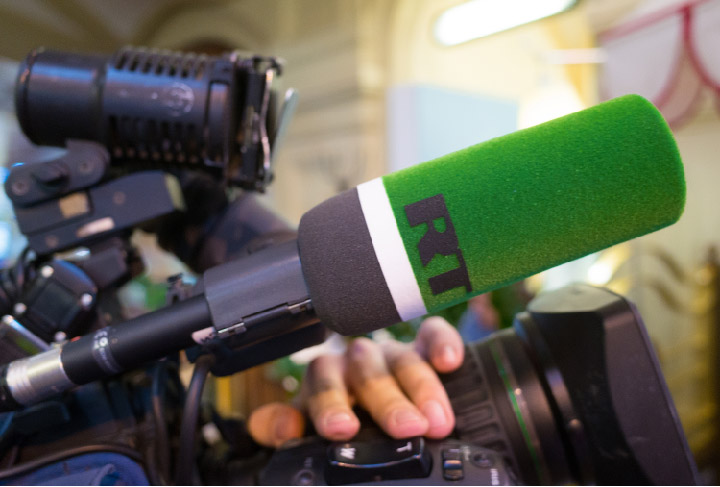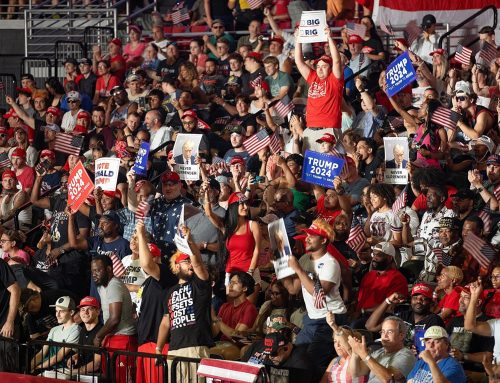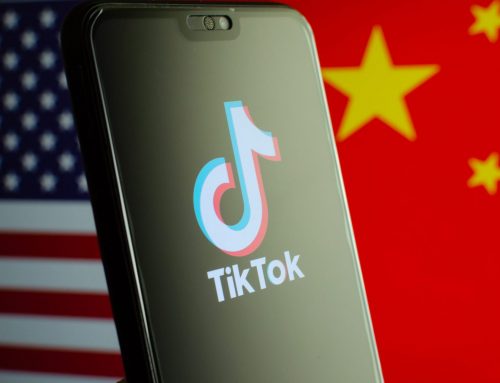Overview
The United States and its allies were, once again, the primary targets of negative messaging from Russia, China, and Iran’s diplomats and state media last week. Kremlin-funded media hammered the Baltic states for a second straight week after Lithuania joined Latvia in banning several Kremlin-funded media outlets, and attacked various transatlantic countries on issues related to Huawei, Nord Stream 2, and arms control. China’s messengers continued their months-long criticism of the Trump administration’s response to the coronavirus (which included a renewed effort to promote a conspiracy theory related to the origins of the virus), while also attacking Canada, Australia, and the U.K. for “interfering” in their domestic affairs after the three countries criticized Hong Kong’s new national security law. Finally, Iranian media and government officials took aim at the EU and U.S. in advance of the fifth anniversary of the signing of the Iran nuclear deal, while promoting their close ties with Russia and, to an even greater extent, China, perhaps foreshadowing a reported partnership agreement between Tehran and Beijing.
Russia Toplines
Last week, Russian officials and state-funded media, reacting to Lithuania’s decision to join Latvia in banning RT channels from broadcasting in their countries, claimed that a campaign of discrimination against Russian-language media is underway in the Baltics. A small amount of content also addressed international arms control, with Russia cast as reliable and well-intentioned and the United States characterized as uncooperative. On YouTube, RT pushed at points of tension in Transatlantic relations, namely Huawei’s role in 5G infrastructure and Nord Stream 2.
China Toplines
With the national security law in Hong Kong passed and tensions with India slowly receding from global headlines, coverage of Hong Kong and India were down last week compared to the two weeks prior. However, topics related to Hong Kong and India still received significant attention from Beijing’s messengers last week, with particular focus paid to countries that criticized the new national security law. Continuing a months-long trend, Beijing’s steady barrage of criticism of the United States—especially in relation to the Trump administration’s handling of the coronavirus health crisis—was also particularly salient last week.
Iran Toplines
Iranian state-backed media this past week focused on three familiar threads: criticism of Israeli designs on the West Bank, attacks on the United States over its withdrawal from the Iran nuclear deal (in advance of the 5 year anniversary of the signing of the original agreement), and praise for Russia, China, and other U.S. adversaries. The usual praise for Russia and China and amplification of their narratives included a few tweets about a possible partnership agreement between Iran and China—a subject likely to receive significant coverage in the coming week.
Top Accounts
Russian, Chinese, and Iranian state-funded media and government and diplomatic corps accounts:
Top 10 Accounts by Tweets, Likes, and Retweets — July 4-July 10:
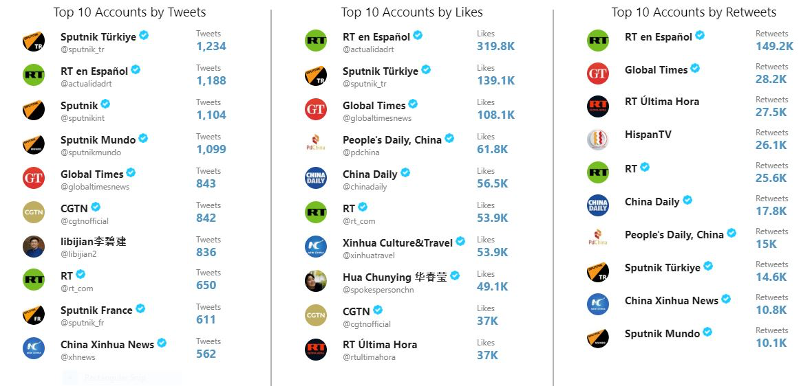
Top Hashtags
Russian, Chinese, and Iranian state-funded media and government and diplomatic corps accounts:
Top 10 Hashtags — July 4-July 10:
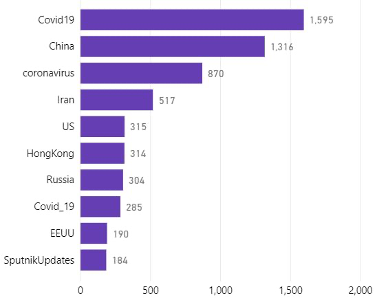
Top Countries Mentioned
Top 10 countries mentioned by Russian, Chinese, and Iranian messengers on Twitter, YouTube broadcasts, and state-sponsored websites — July 4-July 10 (NOTE: there is no broadcast data for Iran):
Twitter mentions:
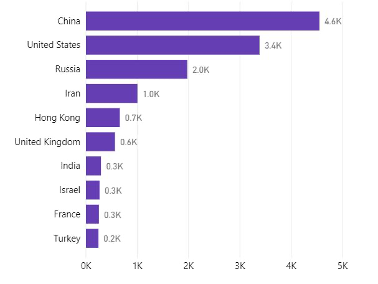
Broadcast Mentions:
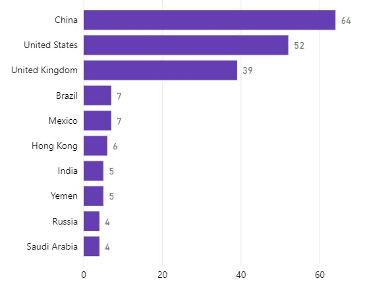
Website Mentions:
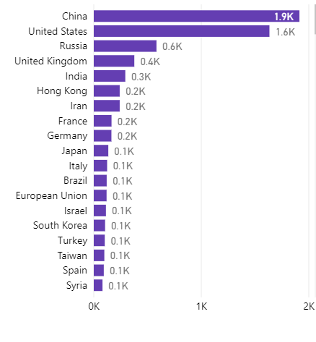
Russia
Russia Claims Discrimination against Russian-Language Media in the Baltics as Lithuania Follows Latvia in Banning RT
Following Latvia’s decision to ban seven RT channels from broadcasting in the country on June 30, Lithuania made a similar move last week, banning five. Both countries cited EU-sanctioned media executive Dmitry Kiselyov’s “de facto” control of RT. Like the previous week, Russian diplomats accused the two Baltic countries of censorship and discrimination against Russian-language media and disputed any connection between Kiselyov and RT. In some cases, Russian officials also drew a link to the Estonian authorities’ earlier move to potentially prosecute Sputnik Estonia staff due to EU sanctions on Kiselyov, which culminated in the end of Sputnik’s operations in Estonia in January:
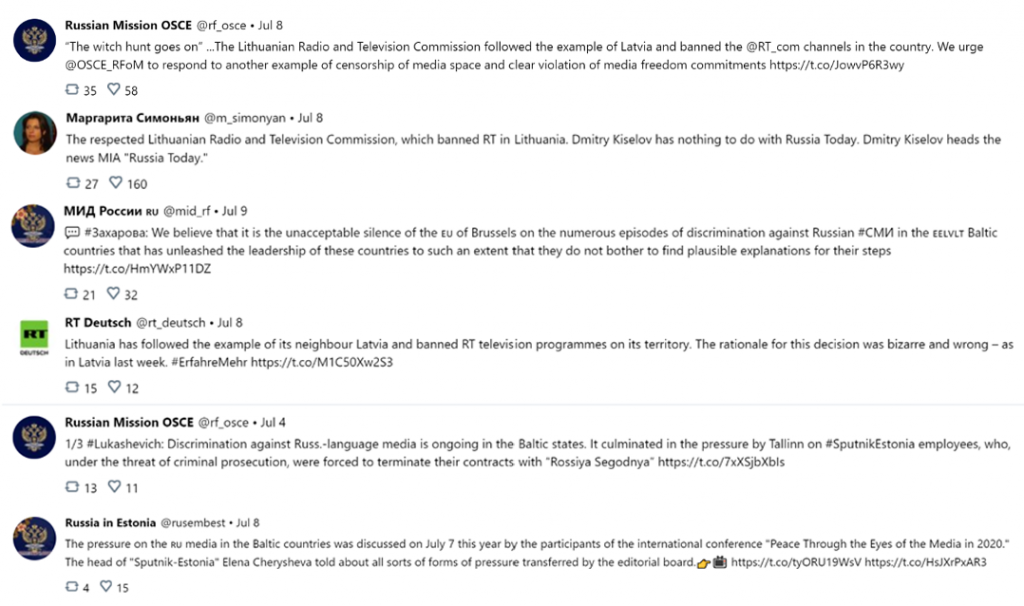
“Here we go again! This time Lithuania BANS RT, claiming it is led by journalist who heads TOTALLY DIFFERENT network,” RT, July 8, 2020.
“Lithuania has followed its neighbor Latvia’s lead to ban five RT channels based on “recommendations” from the country’s Foreign Ministry, but offered the same bogus and bizarre excuse for the decision.
“Indeed, officials in Vilnius were no more creative with their reasoning for the ban than those in Riga last month, as they came up with the same faulty logic to justify their censorship. Announcing the ban, the regulator said it was being handed down because RT is headed by Russian journalist Dmitry Kiselyov, who is under EU sanctions. In actual fact, Kiselyov has nothing to do with RT and heads an entirely different news organization called Rossiya Segodnya.”
“Lithuania’s Television Commission Bans Broadcasting of Five RT Channels,” Sputnik News, July 8, 2020.
“The Lithuanian Radio and Television Commission (LRTK) has banned the broadcasting of five RT channels in the country, following the example of neighbouring Latvia, commission chairman Mantas Martisius said on Wednesday . . . Last week, Latvia banned the broadcasting of seven RT channels (namely RT, RT HD, RT Arabic, RT Spanish, RT Documentary HD, RT Documentary, RT TV), saying they are all owned by Rossiya Segodnya International Information Agency Director-General Dmitry Kiselev, who is under EU sanctions. Notably, Rossiya Segodnya and RT are two different legal entities, RT is not chaired by Kiselev, and RT Editor-in-Chief Margarita Simonyan is not under any EU sanctions.”
“Lithuanian regulatory commission bans Russian TV broadcasts,” TASS, July 8, 2020.
“The radio and television commission of Lithuania, accountable to the parliament, which controls the activities of radio and television broadcasters in the country, has banned the broadcasting of the Russian RT Group TV channels, chairman of the regulatory commission Mantas Martisius told reporters on Wednesday . . . Commenting on the [similar] move [taken earlier by Latvia], Russian Foreign Ministry Spokeswoman Maria Zakharova called on international structures to provide a reaction to the actions of the regulating body. According to her, such discriminatory steps taken by Latvian officials against Russian media resources and the attempts to rid the informational space of alternative points of view are a blatant violation of international law, namely the law of freedom of opinion and equal access to information.”
Russia Casts Itself as the Reliable Actor in Arms Control, Criticizes United States and Britain
In the past few years, the United States has pulled out of or announced its intention to pull out of several major arms control treaties involving Russia, and Russia often uses these decisions as evidence that the United States is not a reliable partner in global arms control. Last week was no exception, with the Kremlin continuing to deny claims that it had violated any treaties. Russian officials and state media also suggested that the United States was responsible for the crumbling of international arms control agreements and that Russia has attempted in good faith to negotiate the continuation of the Treaty on Open Skies:
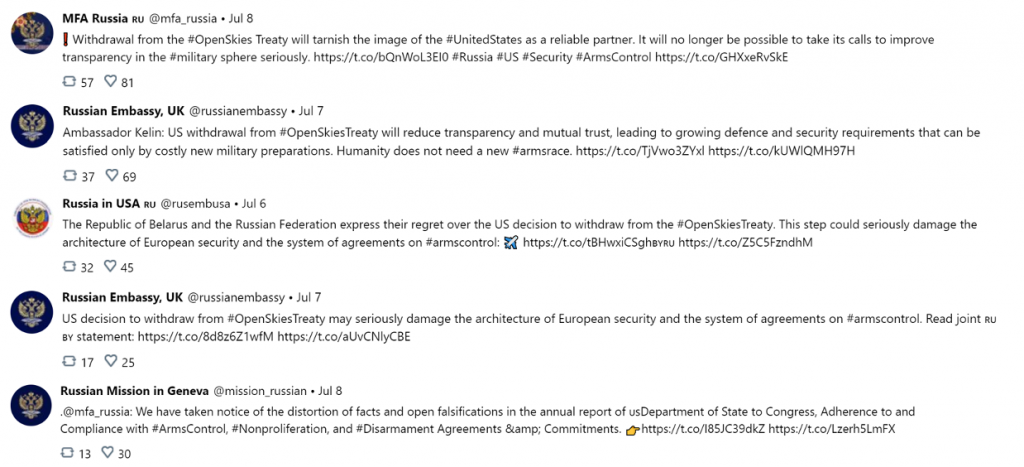
“Moscow Warns Open Skies Treaty to Crumble in ‘Domino Effect’ if More Nations Follow US Suit,” Sputnik News, July 4, 2020.
“In May, the US announced its intention to pull out of the 2002 treaty, allowing reconnaissance flights over some 34 participating countries, unless Russia adheres to its terms. Moscow has repeatedly denied breaching the agreement. The Treaty on Open Skies may follow a “domino effect” and fall apart if other countries follow the US lead and withdraw from the agreement under pressure from Washington, Russian Deputy Foreign Minister Sergei Ryabkov warned on Saturday.”
“Russia to make necessary steps over US withdrawal from Open Skies Treaty — ambassador,” TASS, July 8, 2020.
“Russia’s defense ministry and other relevant governmental agencies will take all the necessary measures over the United States’ withdrawal from the Open Skies Treaty, Russia’s Ambassador to US Anatoly Antonov said on Wednesday . . . Antonov said that by quitting the treaty, the United States demonstrated the lack of political will to search for mutually acceptable solutions.”
“Situation in arms control far from optimistic, says Russia’s UN envoy,” TASS, July 9, 2020.
“The Russian-US talks on arms control held in Vienna in June cannot inspire optimism, Russia’s Permanent Representative to the UN Vassily Nebenzia said in an interview with TASS First Deputy Director General Mikhail Gusman on Thursday . . . Nebenzia pointed out that the United States has already steered the course towards dismantling the arms control system, which was created throughout decades and served as the foundation for strategic stability.”
Meanwhile, amid U.S. efforts to bring China into negotiations on the extension of the New START Treaty, Russian state media reported on China’s unwillingness to participate and cast the U.S. position as generally “not constructive,” while reiterating Moscow’s desire for the treaty’s extension:
“Medvedev on New START: New Weapons Should Also Be Discussed, But US is Unwilling,” Sputnik News, July 9, 2020.
“In early June, a top US opposition lawmaker, Senator Bob Menendez, announced that he introduced a bill to immediately extend the New START treaty and restrict President Donald Trump from undermining the last remaining major strategic arms control regime with Russia. The deputy chair of the Russian Security Council, Dmitry Medvedev, said he was “extremely sceptical” about the extension of the New START nuclear arms treaty because of Washington’s position on the matter. “I am extremely sceptical about this because of the US stance. It is not constructive at the moment,” Medvedev said in an interview with the KP publishing house released Thursday.”
“Moscow Will Not Press China to Join US-Russia Arms Control Talks, Russian Ambassador Says,” Sputnik News, July 8, 2020.
“Russia respects China’s reluctance to join the arms control talks with the United States and Moscow will not exert pressure on Beijing to change its stance, Russian Ambassador in Washington Anatoly Antonov said during an online briefing hosted by the National Interest think tank. Beijing has been reluctant to join arms control treaties along with the United States and Russia, insisting its arsenal and stockpiles are far smaller than their US and Russian equivalents.”
“China views US attempts to involve it in talks on New START Treaty as political hoax,” TASS, July 10, 2020.
“The US attempts to involve China in the trilateral talks on the reduction of nuclear weapons is a political hoax by Washington. As Zhao Lijian, the Chinese Foreign Ministry’s official representative, said on Friday at a briefing, the US should accept the Russian proposal and extend the Treaty on Measures for the Further Reduction and Limitation of Strategic Offensive Arms (the New START Treaty).”
“China snubs US nuke meeting, says we’ll attend if…,” RT America, July 10, 2020.
“China is refusing to participate in nuclear arms control talks with the US and Russia. Chinese officials believe that the US isn’t serious about reducing its nuclear arsenal.”
Finally, Russian state media cast the U.K. as hypocritical for resuming arms sales to Saudi Arabia despite reports of human rights violations in the course of its intervention in the Yemeni Civil War:

“Greedy Britain’s morality-preaching sanctions list immediately made worthless by pandering to warmongering Saudi Arabia,” Op-ed, RT, July 8, 2020.
“Britain unveiled its version of the so-called Magnitsky laws, preaching human rights and justice, but then took all the shine off by resuming arms sales for Saudi Arabia’s illegal war on Yemen.”
“UK resumes arms sales to Saudi Arabia, says ‘possible’ war crimes in Yemen are ‘isolated incidents,’” RT, July 7, 2020.
“The UK government has come under fire after announcing that it is to recommence arms sales to Saudi Arabia, despite acknowledging that the kingdom could be using them to commit war crimes in Yemen.”
“‘Selling our souls’: British bombs headed for Yemen,” RT America, July 8, 2020.
“The UK intends to resume selling weapons to Saudi Arabia, a practice which it had suspended last year after a legal challenge based on the use of US and UK weapons in the tremendously destructive Saudi war on Yemen, which has caused hundreds of thousands of deaths.”
Russian state-funded media and government and diplomatic corps accounts:
Top 10 Hashtags — July 4-10:
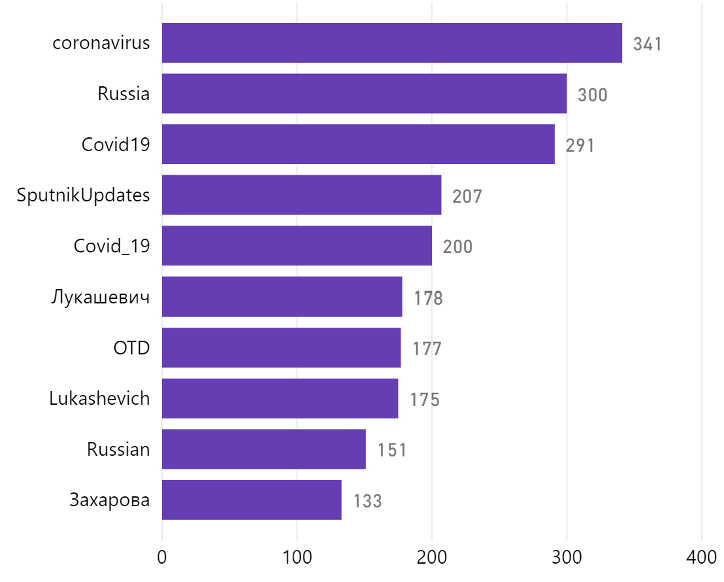
Among the top hashtags are the names of prominent Russian diplomats, Permanent Representative to the OSCE Alexander Lukashevich and Foreign Ministry Spokesperson Maria Zakharova, reflecting a spate of diplomatic messaging citing them. Lukashevich commented extensively on the conflict in eastern Ukraine, making standard Kremlin accusations against Ukraine and the West, and alleged “glorification” of Nazism in the Czech Republic. Zakharova made more varied statements, including the claims of language discrimination in the Baltics noted above:
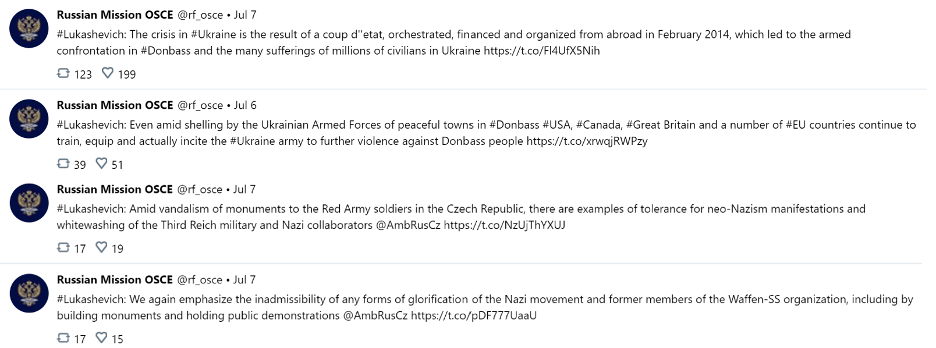
Negative messaging targeting Ukraine coincided with the release of another leaked tape of an alleged conversation between Democratic presidential nominee Joe Biden and former Ukrainian President Petro Poroshenko, where Biden allegedly chastises Poroshenko over Ukrainian “intelligence operations” in Crimea.
On the coronavirus, coverage of which accounted for about 11 percent of output (based on tweets mentioning “virus,” “covid,” “outbreak,” or some combination thereof), RT’s Spanish-language service touted the Russian drug Avifavir, which has been approved in Russia as a treatment for COVID-19.
Finally, pushback against the reports of Russia offering bounties to the Taliban to target coalition forces in Afghanistan continued at a smaller volume, hitting largely the same points as the previous week—namely questioning the U.S. intelligence community:
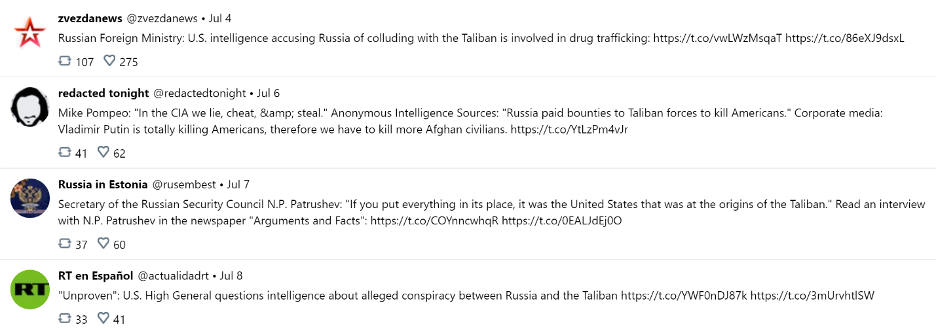
Websites
Russian government-funded websites:
In last week’s top article based on Facebook engagement, RT continued its pattern of accusing “elites” of hypocrisy, this time targeting actor Robert De Niro:
“Who’s the ‘con artist’ now? Robert De Niro’s restaurant chain taking up to $28 MILLION from Trump admin Covid-19 relief loans,” RT, July 7, 2020.
“Despite his well-known distaste for Donald Trump, multi-millionaire actor Robert De Niro’s Nobu restaurant chain has received up to $28 million in government relief loans originally intended to help small businesses . . . Now, it seems staff wages at the fancy restaurants are being partly paid out by the Trump administration’s Paycheck Protection Program — a cornerstone of the government’s response to the economic impact from the coronavirus, CNBC first reported. It’s fair to say the actor, reportedly worth a cool $500 million, isn’t a huge fan of US President Donald Trump — but that didn’t stop him from tapping into the loan fund.”
Broadcasts
Russian state-owned media:
In Russian state-owned media broadcasts last week, RT took the opportunity to poke at points of tension in Transatlantic relations, such as Chinese company Huawei’s role in 5G infrastructure and the Nord Stream 2 pipeline. On Huawei, amid reports that the U.K. was looking to further reduce the use of Huawei equipment in its 5G network, RT UK framed the decision as the U.K. caving in to U.S. pressure while drawing direct equivalences between the United States and China (with a commentator accusing both of “questionable” treatment of minorities and non-adherance to international treaties). RT America took a more nuanced approach, for instance noting the Chinese government’s involvement in large Chinese companies. Meanwhile, RT America indicated that U.S. opposition to Nord Stream 2 is driven by a desire for continued U.S. access to the European energy market:
“Boris bowing to America? Huawei’s 5G future in jeopardy,” RT UK, July 6, 2020.
“Is Boris bowing to America? With ‘leaked’ reports stating US sanctions against Huawei would make its telecoms equipment less safe to use, Johnson is now questioning the company’s role in the UK’s 5G infrastructure.”
“UK chooses between US and China with decision on Huawei 5G,” RT UK, July 6, 2020.
“No backdoors but a few flaws: why will the UK be ending Huawei’s involvement in the country’s 5G technology? Tech expert Bill Mew explains why we’re in-between a battle between China and the US, with a trade deal being the stakes.”
“British MPs Bash Huawei,” RT America, July 10, 2020.
“Chinese telecom giant Huawei is taking heat in the UK as security concerns abound amid US pressure. We break down the controversy and what could lie in store for the British Isles.”
“US doesn’t want Germany to connect to Nord Stream — here’s why!” RT America, July 7, 2020.
“Denmark has approved the completion of the Nord Stream 2 pipeline, a giant joint project that will give Germany access to massive amounts of cheap natural gas from Russia. The US, fearing the loss of the European energy market to Russia, has condemned the project and is threatening sanctions against EU countries.”
Other notable videos included further pushback on the reports of Russia offering bounties to the Taliban to target coalition forces in Afghanistan and continued coverage of developments in the Jeffrey Epstein saga:
“NY Times ‘Russian bounty’ story falling apart,” RT America, July 8, 2020.
“The New York Times has acknowledged the dearth of real evidence behind their allegations in June that Russia paid bounties to the Taliban to encourage the death of US-led coalition troops in Afghanistan.”
“Bombshell: Ghislaine Maxwell secretly recorded Jeffrey Epstein,” RT America, July 6, 2020.
“Ghislaine Maxwell, alleged accomplice of deceased pedophile Jeffrey Epstein, is in police custody and reportedly ready to name co-conspirators in Epstein’s circle. What high-profile figures have the most to fear from Maxwell’s testimony?”
China
Disparaging the United States
After White House adviser Peter Navarro accused Beijing of “[spawning] the virus” on MSNBC, deputy spokesperson at the Chinese Foreign Ministry Zhao Lijian counterattacked by rehashing an earlier conspiracy theory surrounding the Fort Detrick laboratory in the United States:

The next day, spokesperson Hua Chunying weighed in on the issue by sharing a screenshot of a viral tweet from American author Stephen King:
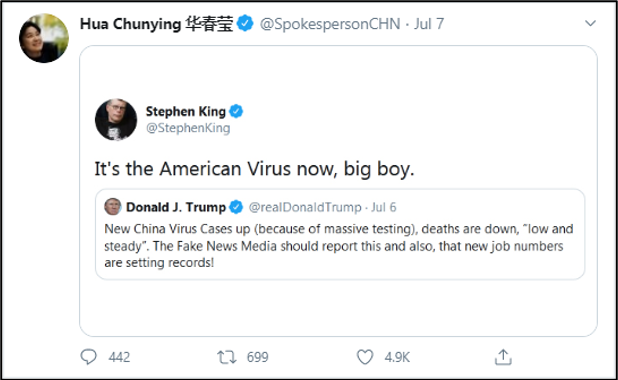
Accompanying the abrasive rhetoric out of the Chinese Ministry of Foreign Affairs, state media ran several video segments last week highlighting the negative consequences of the coronavirus crisis in the United States, from economic hardship to various instances of uncivility related to the use of face masks:
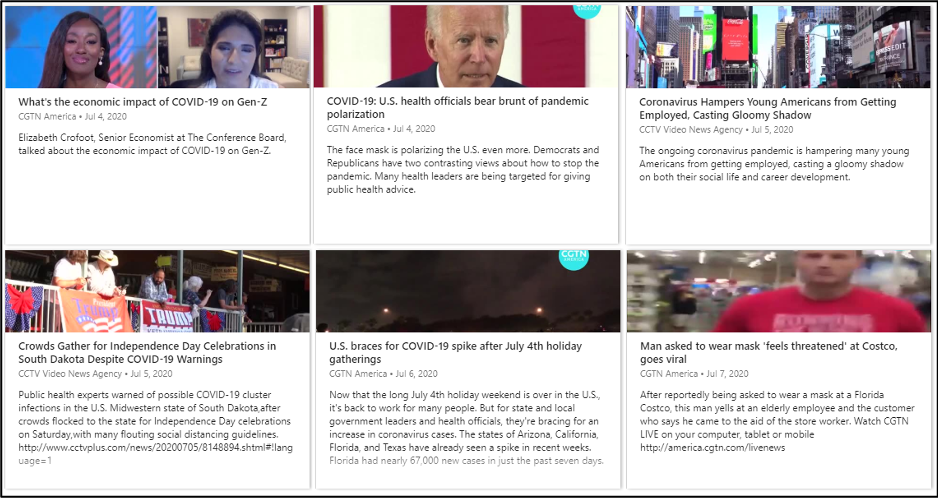
Related to the health crisis, Chinese state media criticized the United States’ decision to withdraw from the World Health Organization. People’s Daily and Xinhua highlighted the country’s isolation: “U.S. withdrawal from WHO: a globally “unsupported” decision” and “Roundup: U.S. decision to quit WHO sparks outrage among experts worldwide.” CGTN, meanwhile, took aim at U.S. leadership: “Trump’s WHO withdrawal sacrifices national interests for self-gains.”
Nevertheless, Chinese Foreign Minister Wang Yi seemed to extend an olive branch to the United States:
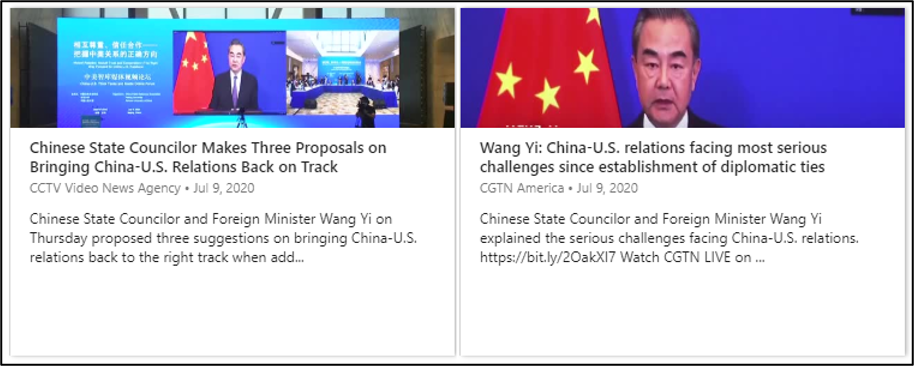
However, it is worth emphasizing that articles covering Wang’s speech varied in tone, from Xinhua’s “Chinese FM makes suggestions on bringing China-U.S. relations back to right track” to CGTN’s “Wang Yi: China will not, and cannot, be another U.S..” Similarly, Hua Chunying’s tweets in the days around the speech oscillated between describing the United States as a potential partner and as a geopolitical threat:
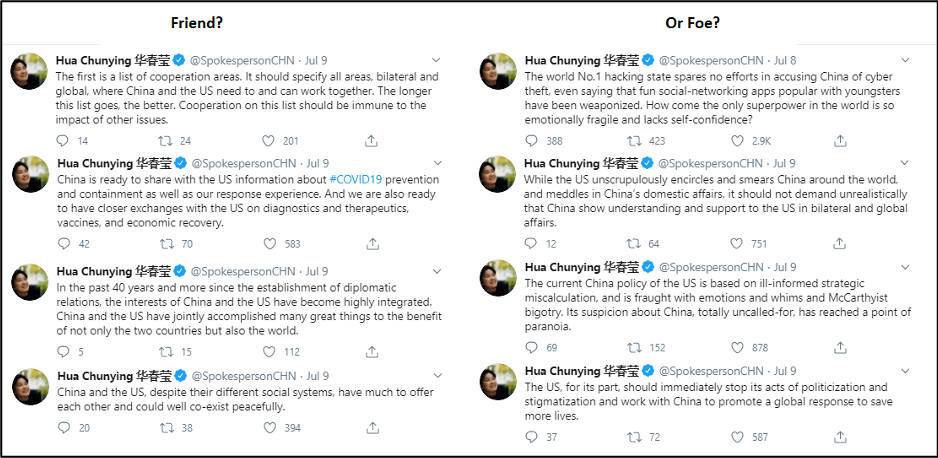
Rebuffing International Dissent on Hong Kong
Among the Chinese Twitter accounts monitored on Hamilton, #HongKong was the fourth most-used hashtag last week, and the third most used by diplomats and government officials. However, overall uses of the hashtag declined from 758 during the week running from June 27 until July 3 to just 342 last week.
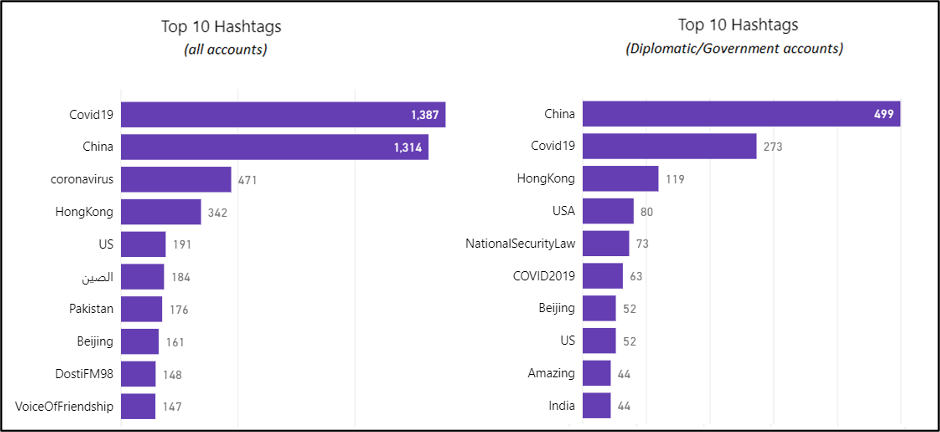
The variety of arguments used to defend the national security law two weeks ago coalesced around the objective of attacking countries that voiced their disagreement with Beijing’s new policies in Hong Kong. The United Kingdom, in particular, was the target of Beijing’s ire after it announced that it would put in place a path to citizenship for around 3 million Hong Kong residents who hold, or are eligible for, a British National (Overseas) passport. As a result, the United Kingdom was mentioned roughly the same number of times as the United States in tweets using #HongKong. While most of these mentions came from the Chinese ambassador in London, foreign ministry spokesperson Zhao Lijian also commented on the British government’s offer to Hong Kong residents:

Xinhua and Global Times also attacked the UK in a series of articles: “Chinese ambassador slams Britain’s “gross interference” in China’s internal affairs”; “UK bluffs over Hong Kong;” and “Cost of emigrating HKers to UK too high.”
Beijing, led by Zhao Lijian, also expressed its displeasure with Canada and Australia:
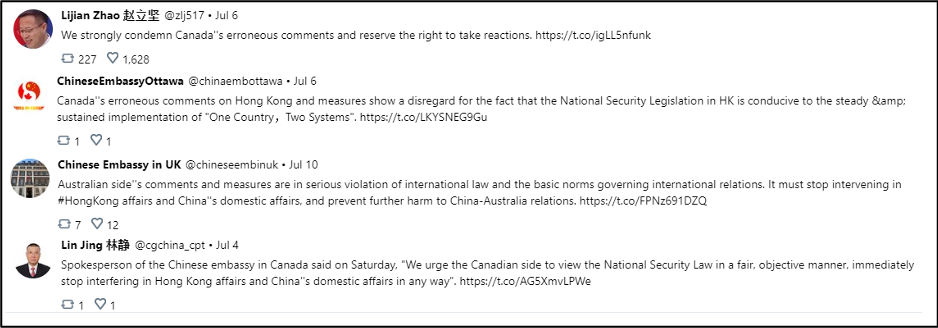
In support of the diplomatic voices criticizing Ottawa and Canberra, state media ran a number of articles slamming Canada and Australia’s response to the national security law: “Hong Kong officials slam Canada for suspending extradition treaty,” “Ministry warns Canada against interference in SAR affairs,” “China urges Australia to stop meddling in Hong Kong affairs,” and “China condemns Aussie’s HK-related moves as interference in internal affairs.”
Hot and Cold with India
After weeks of tensions following clashes at the Indian-Chinese border and India’s subsequent decision to ban Chinese apps from its market, last week marked a return to some measure of calm in Chinese-Indian relations. The Chinese ambassador to ASEAN was the first to highlight positive conversations between both countries. Beijing’s Ministry of Foreign Affairs then officially announced that talks were yielding results, giving the Chinese ambassador to New Delhi a chance to emphasize diplomacy and “win-win” relations in a tweet thread:
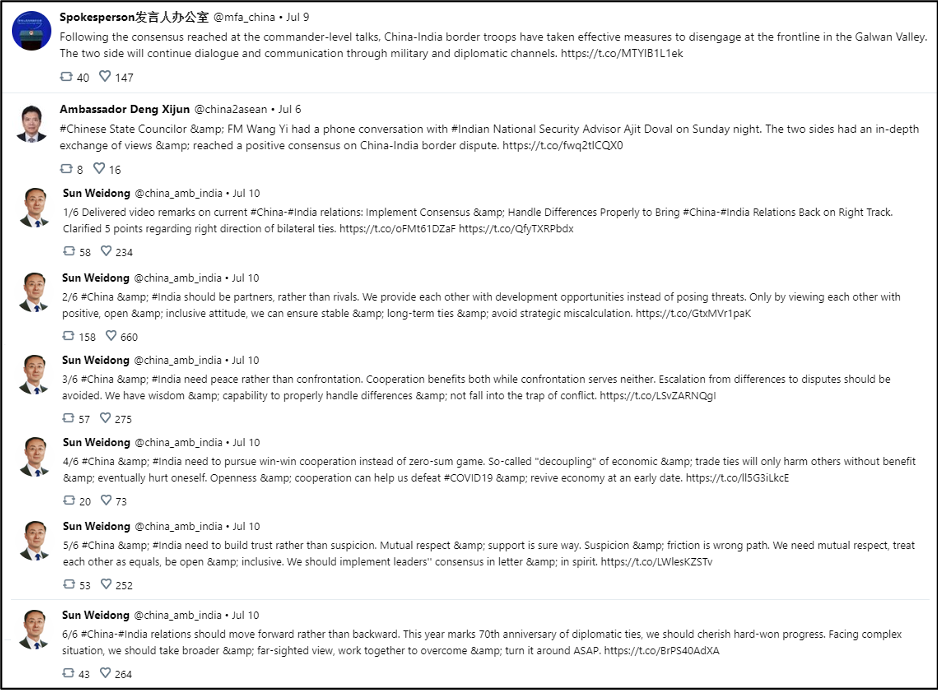
Similarly, several articles published by state media echoed similar talking points, including: “China, India reach positive consensus on easing border situation” and “Chinese, Indian special envoys agree to avoid further escalation in Galwan Valley in phone talks.” The tone in both marked a clear de-escalation from Beijing’s rhetoric in previous weeks.
Simmering tensions were still evident, however, in messaging from the Chinese ambassador to Pakistan and the Consul General in Cape Town:

On the state media side, the ever-nationalist Global Times, led by their provocative editor-in-chief, blamed the United States for the tensions between the two Asian giants:

Chinese state-funded media and government and diplomatic corps accounts:
Top 10 Hashtags — July 4-July 10:
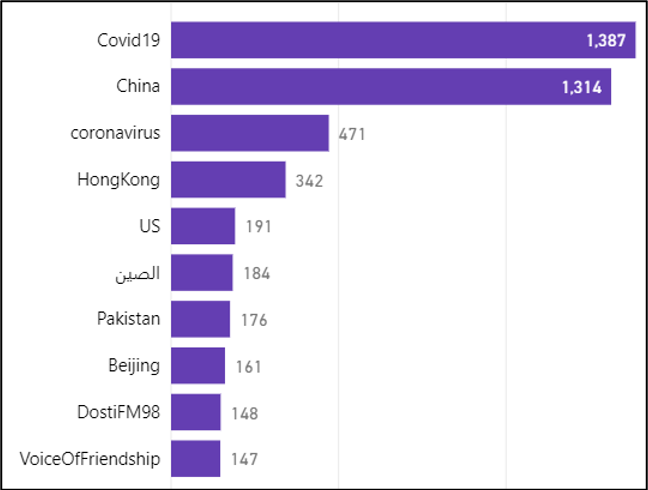
The Hamilton dashboard collected about 14,000 tweets from monitored Twitter accounts between July 4 and July 10. #Covid19 reclaimed the top spot while #NationalSecurityLaw and #HK fell out of the top ten entirely.
In topics not already covered, a short tweet thread by Hua Chunying shows how Beijing and Moscow use their relationship to give legitimacy to each other’s authoritarian measures:

Websites
Chinese government-funded websites:
State media ran almost 50 Huawei-related stories last week, many of them revolving around European countries’ decision on whether to allow the telecom company in their 5G networks:
“The United Kingdom has made the wrong choice on Huawei,” CGTN, July 6, 2020.
“However, in the heat of anti-Huawei hysteria that has been whipped up by the United States and peddled by the mainstream media uncritically, [British newspapers and commentators fail] to acknowledge the economic and technological ramifications for the country.”
“Europe can’t afford to fully ban Huawei,” China Daily, July 8, 2020.
“European countries (…) may not entirely exclude Huawei from their telecom sectors because they know nationalism and ideological bias cannot help solve problems in the age of globalization.”
“China urges France to make independent choices over 5G network,” Xinhua, Jul 7, 2020.
“We hope France can uphold an objective and fair attitude, respect market rules and the will of enterprises, make independent choices that serve its own interests.”
In a story that was among the ten most-shared on Facebook last week, Chinese media reported on a pneumonia outbreak in Kazakhstan:
“Chinese Embassy in Kazakhstan urges caution following reports of ‘unknown pneumonia,’” Global Times, July 9, 2020.
“The Chinese Embassy in Kazakhstan on Thursday warned Chinese citizens living in the country of a local pneumonia of unknown cause, which local media reported has a “much higher” fatality rate than COVID-19.”
Broadcasts
Chinese state-owned media:
There was a hint of schadenfreude in Chinese state media’s coverage of Brazilian president Jair Bolsonaro testing positive for the coronavirus:
“Watch the moment Bosonaro said he caught COVID,” CGTN America, July 7, 2020.
“Brazil’s far-right President Jair Bolsonaro says he’s been diagnosed with COVID-19, after downplaying the risk of the pandemic for months.”
“Brazilian president Bolsonaro tests positive for COVID-19,” CGTN America, July 8, 2020.
“Brazil’s president Jair Bolsonaro confirmed on Tuesday that he’s tested positive for COVID-19. Throughout the pandemic President Jair Bolsonaro dismissed the severity of COVID-19. He even referred to it as a ‘little flu.’”
A significant portion of CCTV’s video segments from last week were devoted to the extreme meteorological conditions currently battering China, with some of the coverage highlighting the authorities’ competence in the face of a natural disaster:
“BeiDou System Saves Locals from Landslides in Central China,” CCTV, July 9, 2020.
“The early warning issued by the BeiDou Navigation Satellite System saved thousands of lives from massive landslides on June 6 in Changde City’s Shimen County of central China’s Hunan Province.”
“Rescuers Busy with Disaster Relief in China,” CCTV, July 8, 2020.
“Rescue teams spared no effort in disaster relief operation, as ongoing rainfalls continued to batter many regions in China, triggering floods and mudslides, and damaging roads and facilities.”
Finally, Beijing added a dose of traditional propaganda:
“Happiness of Households: ‘People are the foundation of a state,’” CGTN America, July 9, 2020.
“A recent survey shows people from the Chinese mainland were satisfied with their government’s anti-COVID-19 measures. (…) Much of this good momentum is credited to the people-oriented governing philosophy, which is deeply rooted in the ancient Chinese culture.”
Iran
Criticism of Israel
As usual, a sizable share of Iranian state-backed media efforts focused on criticizing Israel and casting Iran as the defender of Palestinians. Some stories highlighted abuses by the Israeli government, but most focused on international opposition to any annexation by Israel of West Bank territory. After Iran and the United States, Israel was the third most mentioned country in pro-Tehran media sources:
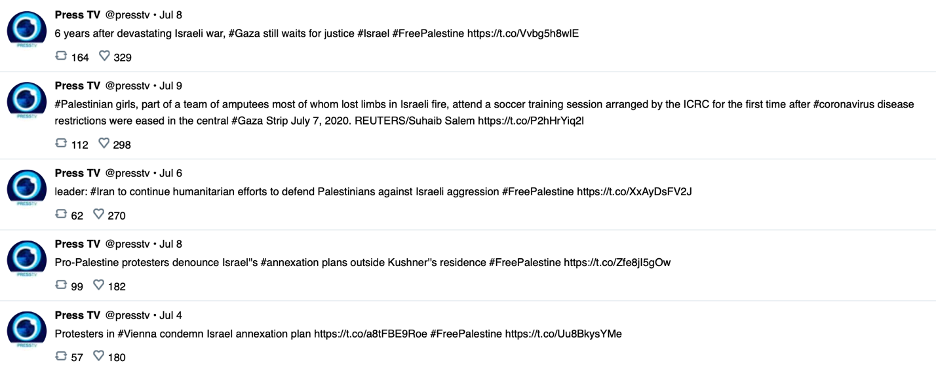
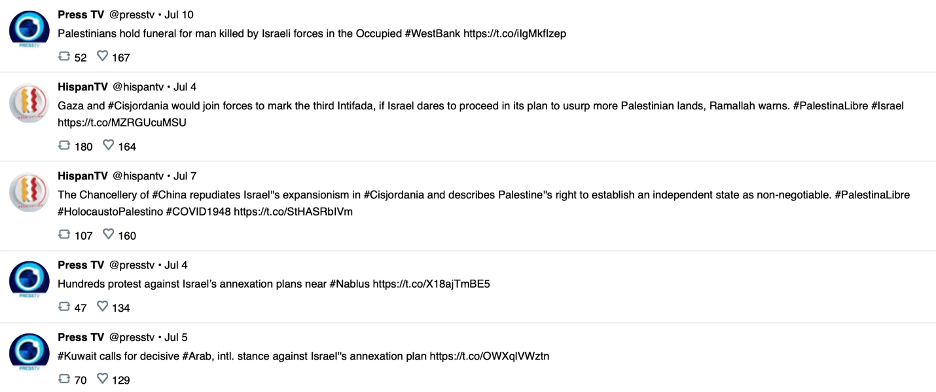
The most engaged-with tweets on this subject came from the Supreme Leader’s account:
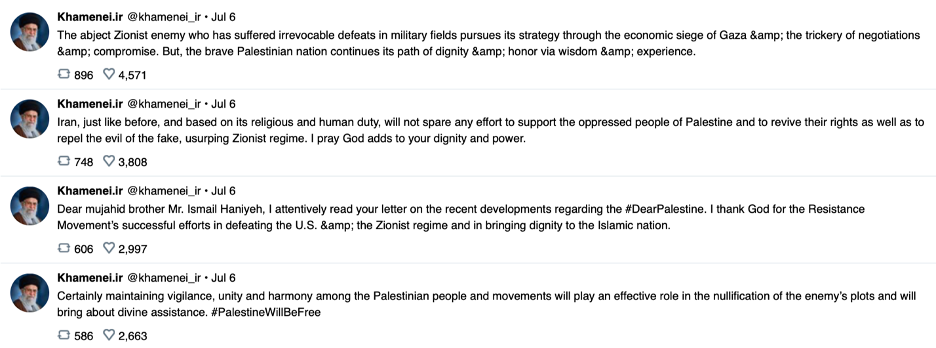
JCPOA Frustrations
Coverage of the Iran nuclear deal (JCPOA) also remained high last week, boosted by the assertion from Foreign Minister Javad Zarif on July 4 that Iran has triggered the agreement’s dispute mechanism six times in the past four years. Most coverage focused on that disclosure, though several stories also amplified Russian messaging opposing new sanctions:
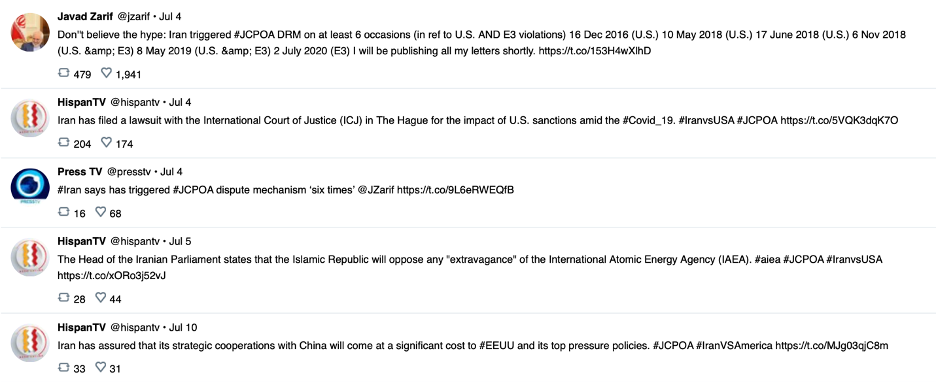
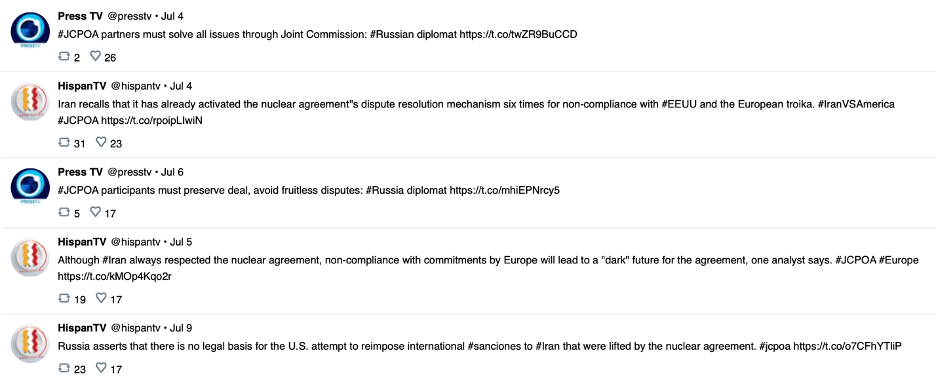
Praise and Amplification for Russia and China
As usual, Tehran-backed accounts spoke glowingly of Russia and China, amplifying stories favorable to them, especially in the context of conflict with the United States. Where possible, Iran framed itself as an equal partner to Russia and China in the community of U.S. near-peer adversaries. Much of this praise and amplification was relatively general:



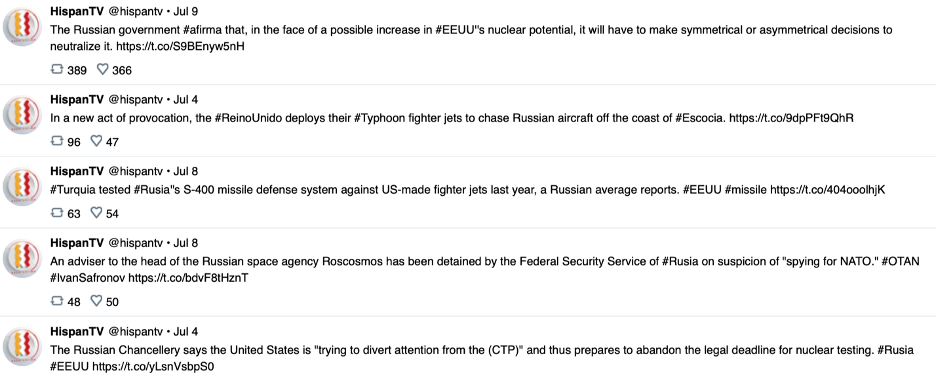

The issue of humanitarian assistance to Syria, though, received special attention, with Iran praising Russia and China for vetoing such assistance at the U.N. Security Council:


Hints at an Iran-China Partnership Agreement
Responding to reports of a broad partnership agreement between Iran and China, Iranian media sought to shape the framing of such an agreement, while avoiding offering new details or confirming rumors. These efforts seem aimed at softening the ground for an agreement by emphasizing the benefits to Iran, and downplaying the weakness of Iran’s negotiating position:



Specific charges that were refuted included the rumor that Iran was planning on giving China control of Kish Island as part of the agreement:

Iranian state-funded media and government and diplomatic corps accounts:
Top 10 Hashtags — June 4-July 10:
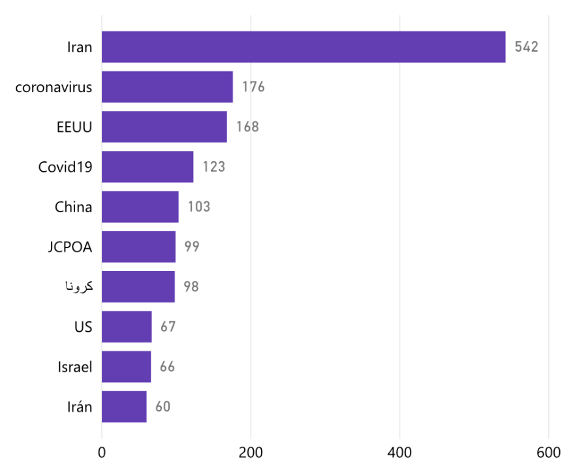
This week, the top-ten hashtags from Iranian state-backed media and diplomatic accounts reflect their ongoing coverage of the JCPOA controversies and the coronavirus pandemic, while also capturing an uptick in coverage of Iran-China relations, which we can expect to continue as more becomes known about a possible partnership agreement.
Websites
Iranian government-funded websites:
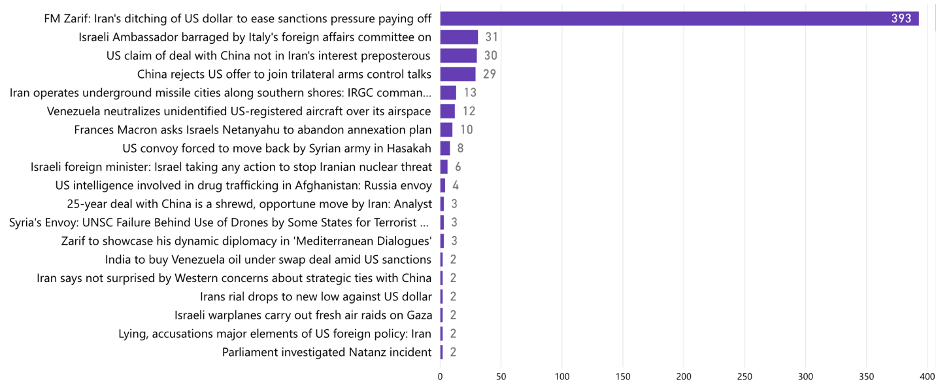
Engagement with Iranian-backed news websites was down across the board last week, with the most engaged-with story garnering only 393 reactions on Facebook, compared with over 1,300 the previous week. The top story by far concerned Zarif’s claim that efforts by Iran and other American adversaries to “ditch the dollar” are paying off:
“FM Zarif: Iran’s ditching of US dollar to ease sanctions pressure paying off,” PressTV, July 5, 2020.
“Foreign Minister Mohammad Javad Zarif has underlined Iran’s achievements in ditching the US dollar, citing the country’s use of barter system to ease up pressure caused by the illegal US sanctions.”

